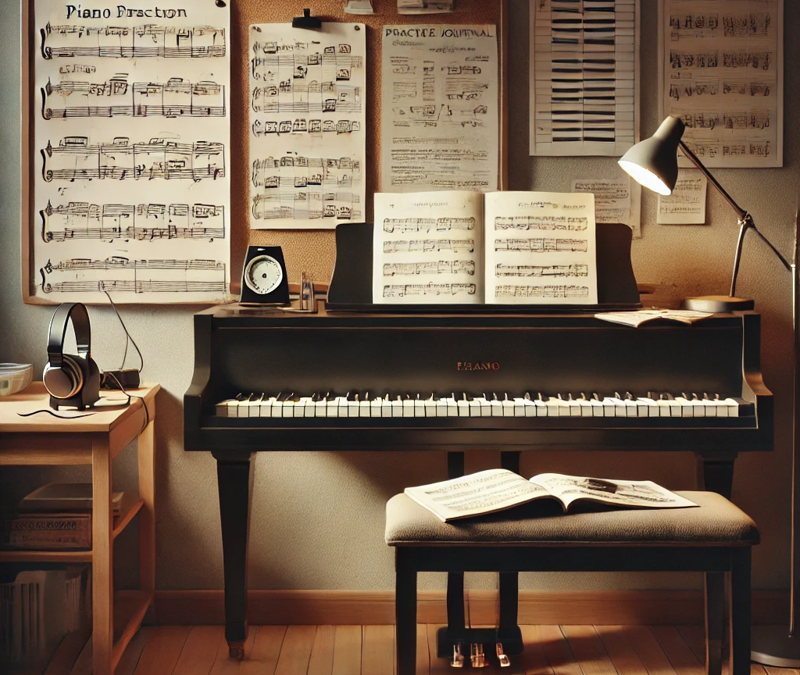How to Practice Piano Guide
Practising Piano Has Never Been So Easy
In a detailed and insightful article, a comprehensive guide was provided to help pianists of all levels craft the ideal daily piano practice routine, focusing on often-overlooked aspects such as ear training, goal-setting, and maintaining motivation. The guide is designed to make practice sessions more structured, efficient, and rewarding, allowing musicians to continuously improve their technical and expressive skills, for your piano lessons in London.
Key Takeaways on How to practice piano:
- Set clear and measurable goals to ensure progress in each practice session.
- A balanced routine includes warm-ups, scales, repertoire, and other essential components for well-rounded musical development.
- Slow, focused practice and consistent repetition are vital for mastering complex passages and improving overall precision.
- Recording practice sessions and seeking feedback from teachers or peers play a crucial role in monitoring progress.
- A dedicated practice space and using short-term rewards can help sustain motivation and consistency.
Define Your Piano Practice Goals
The first step in creating an effective piano practice routine is to set specific, measurable goals. These goals provide structure and purpose to each practice session, helping to maintain focus and direction. Whether you aim to improve hand coordination, master a specific scale, or develop improvisation skills, having a clear target ensures steady advancement. The article emphasizes that identifying the right goals—whether technical or expressive—allows pianists to track their progress effectively and stay motivated. How to practice piano.
Clarify Your Musical Objectives
Knowing what you want to achieve is key. Do you want to work on major and minor keys, focus on rhythm, or develop a unique sound for jazz or classical music? By clarifying your objectives, you can align your practice sessions with your desired skill set and tailor them to your specific needs. This focused approach ensures steady, measurable progress over time.
Identify Specific Skills to Develop
When it comes to refining your piano technique, focusing on developing particular skills is essential. For example, you might concentrate on mastering scales, finger independence, or expressive playing. This focused effort ensures each practice session addresses the most critical elements of your growth, allowing you to make consistent progress toward your broader musical goals.
Set Realistic and Measurable Targets
To ensure that your practice sessions are productive, set realistic, measurable targets for each element of your routine. Breaking down large tasks, such as learning a complex piece, into smaller, achievable goals allows you to monitor your progress and maintain a sense of accomplishment. Whether you’re working on scales, rhythm, or a new composition, measurable targets give structure to your practice and help you stay focused.
Organize Your Practice Schedule
Organizing your practice schedule is essential to maintaining a balanced and effective routine. The article suggests breaking each practice session into focus areas, such as technique, ear training, and repertoire work. This structure helps maintain a comprehensive approach to your development, ensuring no aspect of your playing is neglected. By organizing your time effectively, you’ll achieve a more significant overall improvement.
Determine Optimal Practice Times
Identifying the best times for practice is key to ensuring your sessions are productive. The article recommends finding times when you’re most alert and able to focus, whether early in the morning or later in the day. Optimizing your practice times means you can make the most of each session, improving both your technical skills and musical understanding.
Break Sessions into Focus Areas
Breaking practice sessions into specific focus areas is a method advocated in the article. By dividing your time between technical exercises, sight-reading, ear training, and repertoire, you can ensure balanced progress across all areas of your playing. This approach prevents stagnation and helps you develop a well-rounded skill set.
Allocate Time for Each Practice Element
Another key strategy is to allocate time for each specific element of practice. For example, the article suggests dedicating time to scales and arpeggios, technique exercises, and learning new repertoire. By organizing your sessions and sticking to set timeframes for each task, you’ll maximize the efficiency of your practice and make steady progress.
Develop a Balanced Practice Routine
To become a well-rounded pianist, it’s crucial to follow a balanced practice routine that covers all areas of musical development. The article stresses the importance of incorporating warm-up exercises, scales, and repertoire work into your daily practice. Sight-reading and ear training should also be included to round out your skills and ensure a comprehensive musical education.
Warm-Up Exercises for Technique Enhancement
Starting with warm-up exercises helps prepare your mind and body for the more challenging work to come. The article highlights the importance of finger exercises and scales, which not only improve dexterity but also lay the groundwork for a more productive session. These exercises ensure that your hands are ready to handle the technical demands of your pieces and improve finger strength and independence.
Incorporate Scales and Arpeggios
The article underscores the value of practicing scales and arpeggios daily to develop a solid technical foundation. Regular scale practice helps you become more familiar with key signatures and finger patterns, while arpeggios build hand coordination and finger independence. Including these elements in your daily routine is essential for improving your overall proficiency.
Practice Repertoire Pieces
Dedicating time to working on repertoire pieces is another key component of an effective routine. Focusing on your chosen pieces allows you to apply the technical skills you’ve been practicing, helping you refine your interpretation and musicality. The article emphasizes that regularly practicing repertoire improves not just technique but also expressive capabilities, making you a more versatile pianist.
Include Sight-Reading and Ear Training
Sight-reading and ear training are essential skills that every pianist should develop. The article advocates incorporating both into your daily practice. Sight-reading helps improve your ability to learn new pieces quickly, while ear training enhances your ability to recognize melodies, harmonies, and rhythms. These skills not only make you a more confident musician but also deepen your connection to the music.
Implement Effective Practice Strategies
For practice to be effective, you need to use strategies that maximize learning efficiency. The article suggests several proven techniques, such as slow practice for accuracy and consistent repetition to engrain muscle memory. These strategies help you overcome technical challenges and ensure steady progress toward mastery.
Use Slow Practice for Accuracy
The article emphasizes the importance of slow, focused practice when learning new or difficult passages. By practicing slowly, you allow yourself to focus on accuracy and correct mistakes before they become ingrained. Once you’ve mastered the passage at a slower speed, you can gradually increase the tempo while maintaining precision.
Break Down Complex Passages
When faced with difficult sections of music, it’s helpful to break them down into smaller, more manageable parts. The article advocates this method, explaining that focusing on small sections of a piece allows you to refine each element before putting everything together. This method ensures a smoother, more confident performance when tackling complex pieces.
Apply Consistent Repetition
Repetition is one of the most effective ways to improve at the piano. The article highlights the importance of repeating passages or exercises to solidify your technique and muscle memory. Consistent repetition ensures that each element of your playing is well-rehearsed, resulting in a polished, confident performance.
Utilize a Metronome for Timing
Timing is critical in music, and the article stresses the importance of using a metronome to develop a strong sense of rhythm. Practicing with a metronome helps you stay on tempo and improves your overall rhythmic precision, making it an essential tool in any pianist’s practice routine.
Monitor and Evaluate Your Progress
Tracking your progress is essential to maintaining motivation and ensuring that your practice is effective. The article recommends keeping a practice journal, recording your playing, and regularly seeking feedback from teachers or peers. These methods provide tangible evidence of improvement and help you stay focused on your goals.
Keep a Practice Journal
Maintaining a practice journal is a great way to monitor your progress and stay motivated. By tracking what you practice each day, noting challenges, and celebrating milestones, you can reflect on your journey and make adjustments to your routine as needed. The article suggests that keeping a journal helps pianists stay organized and committed to their goals.
Record Your Playing Regularly
Recording your practice sessions allows you to evaluate your progress objectively. By listening to recordings, you can identify areas for improvement, such as rhythm or articulation, that might not be noticeable during practice. The article emphasizes that regular recordings provide a benchmark for growth and serve as a valuable tool for self-assessment.
Seek Feedback from Teachers or Peers
Regular feedback from teachers or peers is invaluable in refining your piano skills. The article encourages pianists to seek constructive criticism, as it helps identify areas that need improvement and offers encouragement. Feedback can be a powerful motivator, pushing you to reach higher levels of proficiency.
Stay Motivated and Consistent
The final section of the article addresses the importance of staying motivated and consistent in your practice. Creating a dedicated practice space, setting short-term rewards, and periodically refreshing your repertoire are essential strategies for maintaining enthusiasm and progress. How to practice piano Guide.
Create a Dedicated Practice Space
Having a dedicated practice space free of distractions can significantly improve focus and consistency. The article recommends setting up a comfortable, quiet area where you can concentrate on your practice. This dedicated space allows you to fully immerse yourself in your musical journey.
Set Short-Term Rewards
Short-term rewards provide positive reinforcement, making it easier to stay motivated. The article suggests celebrating small achievements, such as mastering a difficult passage, with a reward like a special treat or activity. These rewards help maintain motivation and make practice more enjoyable.
Refresh Your Repertoire Periodically
Finally, refreshing your repertoire periodically is essential for staying engaged and inspired. The article encourages pianists to introduce new pieces or revisit old ones to keep their practice sessions dynamic and challenging. This keeps the passion for learning alive and prevents burnout.
For a comprehensive look at how to optimize your daily piano practice routine, read the full article. This guide offers invaluable information and details for you to master your practice time!

